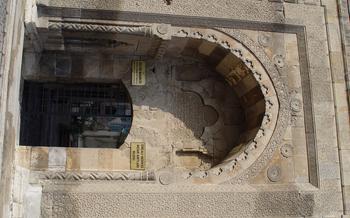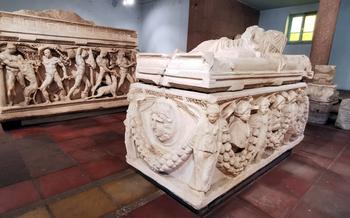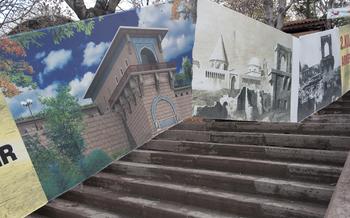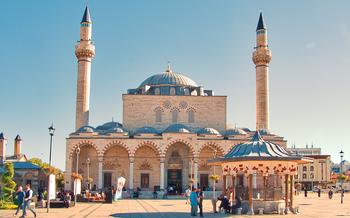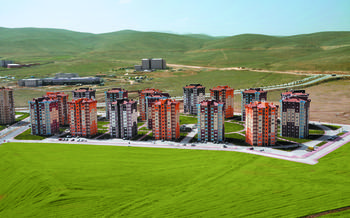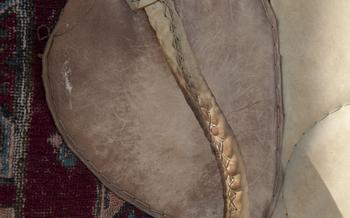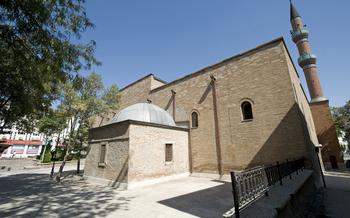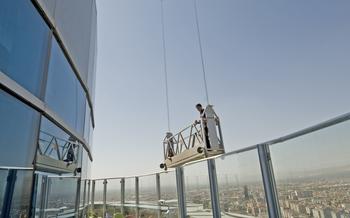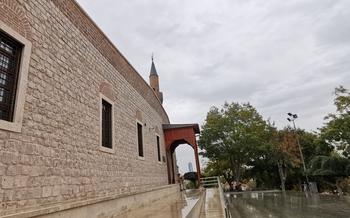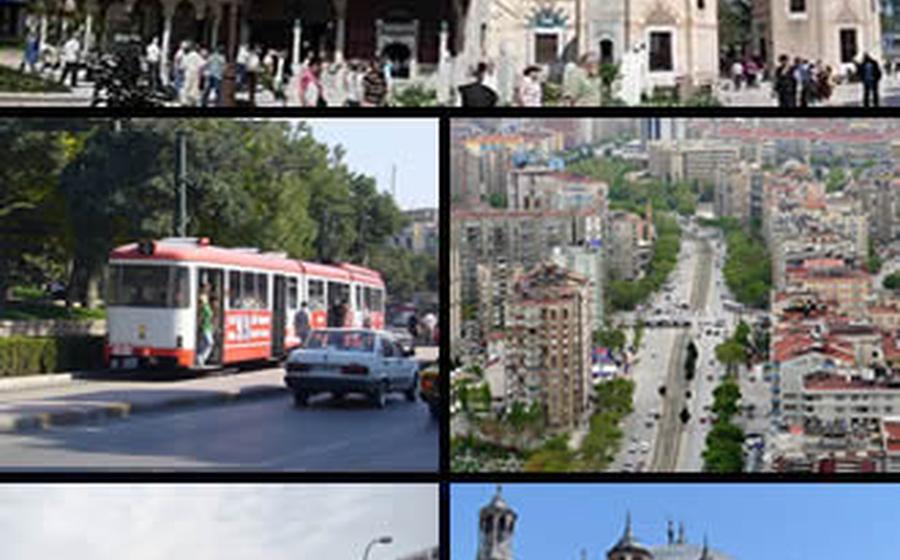
Cavus Bath
- A Journey to History
- A Glimpse into Turkish Bathing Culture
- Experience the Healing Powers
- In the Footsteps of Rumi
- A Welcoming Retreat
- Getting There with Ease
- Dress Code and Amenities
- Health and Safety Measures
- Insider Tip: Unveiling the Hidden Gem
A Journey to History
In the heart of Konya, Turkey, lies a hidden gem that transports visitors back in time to the era of the Seljuk Sultanate. The Cavus Bath, dating back to the 13th century, stands as a testament to the rich history and architectural prowess of the Seljuk dynasty. This magnificent bathhouse, steeped in cultural significance, invites you on a journey through the annals of Turkish bathing traditions and the fascinating stories that unfold within its ancient walls.
The Seljuks, masters of architectural innovation, left an indelible mark on Anatolian architecture, blending Islamic and Byzantine influences to create unique and awe-inspiring structures. The Cavus Bath, a prime example of their architectural prowess, showcases intricate tilework, soaring domes, and exquisite craftsmanship, reflecting the grandeur and opulence of the Seljuk era.
In Turkish culture, bathhouses have long held a pivotal role, serving as social hubs where people from all walks of life converged to cleanse their bodies and souls. These communal spaces fostered a sense of community and relaxation, becoming an integral part of Turkish society. Konya, a city steeped in history and culture, embraced the tradition of bathhouses, and the Cavus Bath emerged as one of its most remarkable examples.
Over time, the ravages of history and neglect took their toll on this architectural masterpiece. However, in recent years, meticulous restoration efforts have breathed new life into the Cavus Bath, ensuring its preservation for future generations to appreciate. Today, it stands as a testament to the resilience of history and the enduring legacy of the Seljuk dynasty, inviting visitors to step back in time and immerse themselves in the grandeur of a bygone era.
A Glimpse into Turkish Bathing Culture
Bathhouses have long held a significant place in Turkish society, serving as cultural hubs and centres for social interaction. The Cavus Bath is a prime example of this tradition, offering a glimpse into the rich bathing customs and rituals that have been passed down through generations.
In ancient Turkey, bathhouses were not just places for cleansing but also for socialization, relaxation, and rejuvenation. People from all walks of life gathered in these communal spaces to bathe, exchange news, and enjoy each other's company. The bathhouse served as a neutral ground where people could connect and bond, regardless of their social status or background.
Traditional Turkish bathing rituals involve a series of steps designed to promote relaxation and cleanliness. Visitors typically start by entering the sıcaklık, or hot room, where they allow the steam to open their pores and soften their skin. Next, they move to the soğukluk, or cold room, for a refreshing contrast that helps to close their pores and invigorate their bodies.
The bathing experience is often enhanced by a kese, or exfoliating massage, which removes dead skin cells and stimulates circulation. This is followed by a sabunlama, or soap massage, using a traditional olive oil soap that lathers into a rich, creamy foam. The masseurs at the Cavus Bath are skilled in the art of kese and sabunlama, ensuring that visitors leave feeling refreshed, rejuvenated, and thoroughly cleansed.
Turkish bathhouses have evolved over time, but they continue to play an important role in Turkish culture. The Cavus Bath, with its historical significance and authentic bathing rituals, offers visitors a unique opportunity to experience this centuries-old tradition firsthand.
Experience the Healing Powers
Beyond its historical and cultural significance, the Cavus Bath is renowned for its therapeutic properties. The bathhouse is built upon a natural hot spring, and visitors can immerse themselves in the warm, mineral-rich waters to experience a range of health benefits.
The thermal waters at the Cavus Bath are known to alleviate pain, reduce stress, and improve circulation. The soothing and relaxing atmosphere of the bathhouse, combined with the healing properties of the minerals and geothermal waters, creates a rejuvenating experience for both the body and mind.
In addition to bathing, the Cavus Bath also offers a variety of massage services that utilize the therapeutic benefits of the thermal waters. These massages help to relax muscles, improve flexibility, and promote overall well-being.
Whether you are seeking relief from physical ailments or simply looking to unwind and rejuvenate, the Cavus Bath offers a unique and therapeutic experience.
In the Footsteps of Rumi
The Cavus Bath is inextricably linked to the life and teachings of Rumi, one of the most celebrated mystics and poets in Islamic history. Rumi, whose full name was Jalal ad-Din Muhammad Rumi, spent much of his life in Konya, where he founded the Mevlevi Order of Whirling Dervishes. The bathhouse, located just a short walk from Rumi's tomb and museum, is believed to have been a favourite haunt of the great Sufi master.
It is said that Rumi would frequent the Cavus Bath to seek solace, inspiration, and rejuvenation. The soothing waters and tranquil atmosphere of the bathhouse provided the perfect setting for contemplation and spiritual reflection. Rumi's teachings emphasized the importance of love, tolerance, and the pursuit of inner peace, values that are deeply embedded in the Turkish bathing culture.
Visitors to the Cavus Bath can still feel the presence of Rumi's spirit as they immerse themselves in the healing waters and explore the hidden chambers of the bathhouse. The bathhouse serves as a living testament to Rumi's legacy and the enduring influence of his teachings on Turkish culture and spirituality.
A Welcoming Retreat
At the Cavus Bath, visitors are greeted with the warmth and hospitality that is synonymous with Turkish culture. The friendly and knowledgeable staff is dedicated to providing personalized services and attention to detail, ensuring that every guest feels comfortable and relaxed. The bathhouse has created a welcoming environment where visitors can unwind, rejuvenate, and immerse themselves in the unique bathing traditions of Turkey. Whether you are seeking a therapeutic retreat or a cultural experience, the Cavus Bath staff is committed to making your visit truly memorable. Guided tours are available for those who wish to delve deeper into the history and significance of the bathhouse, and multilingual assistance is provided to cater to international visitors. With its warm hospitality and personalized services, the Cavus Bath offers a welcoming retreat for all who seek a rejuvenating and culturally enriching experience.
Getting There with Ease
The Cavus Bath is conveniently situated in the heart of Konya's city centre, making it easily accessible from various parts of the city. Whether you prefer to walk, take public transportation, or drive, reaching the bathhouse is a breeze.
For those who enjoy exploring on foot, the Cavus Bath is just a short stroll away from many popular tourist attractions. Take a leisurely walk through the city's charming streets and soak in the local atmosphere as you make your way to the bathhouse.
If you prefer to utilize public transportation, Konya's efficient bus network provides several routes that stop near the Cavus Bath. Simply hop on the bus and enjoy the scenic ride, allowing you to relax and take in the sights of the city.
For those who prefer the convenience of driving, the Cavus Bath offers ample parking space. Once you arrive, you can park your car and enter the bathhouse with ease.
No matter your preferred mode of transportation, reaching the Cavus Bath is a hassle-free experience, allowing you to focus on enjoying the rejuvenating and cultural immersion that awaits you within its ancient walls.
Dress Code and Amenities
The Cavus Bath, like most Turkish bathhouses, has a specific dress code that visitors are expected to follow. It is customary to wear a peshtamal, a traditional Turkish wrap, or a swimsuit inside the bathing areas. Visitors are required to remove their shoes upon entering and are provided with slippers for use inside the bathhouse.
The Cavus Bath provides towels, toiletries, and other amenities to ensure a comfortable and enjoyable bathing experience. Shampoo, conditioner, soap, and body lotion are available for use in the bathing areas. Visitors are encouraged to bring their own swimwear, although rental options may be available.
For those who wish to enhance their bathing experience, a range of massage services is offered at an additional cost. Skilled masseurs and masseuses are on hand to provide traditional Turkish massages, which are known for their therapeutic and relaxing benefits.
To ensure a pleasant and safe visit, visitors are advised to pack light and leave valuables at their hotel or accommodation. Lockers are available for rent to store personal belongings during the bathing experience.
Health and Safety Measures
The Cavus Bath prioritizes the well-being of its visitors by implementing stringent safety protocols. The bathhouse adheres to the highest standards of hygiene and cleanliness, ensuring a safe and enjoyable experience for all. Regular cleaning and disinfection procedures are carried out throughout the premises, maintaining a pristine environment. The staff undergoes thorough training in health and safety practices to handle any situation effectively.
First aid and medical assistance are readily available on-site, providing peace of mind to visitors. Clearly marked emergency exits and signage guide individuals to safety in case of any unforeseen circumstances.
To ensure a healthy and safe bathing experience, visitors are advised to follow the guidelines provided by the staff. Staying hydrated by drinking plenty of water is crucial to prevent dehydration, especially in the hot rooms. It is also essential to listen to your body and avoid overexertion or prolonged exposure to extreme temperatures.
By adhering to these safety measures, visitors can fully relax and rejuvenate in the tranquil ambiance of the Cavus Bath, confident that their well-being is in good hands.
Insider Tip: Unveiling the Hidden Gem
Beyond the traditional bathing rituals and architectural marvels, the Cavus Bath holds a hidden gem that often goes unnoticed by visitors. In the heart of the bathhouse lies a secret chamber, known as the "Hidden Hammam." This secluded sanctuary is believed to have been used by the Seljuk sultans and their families for private bathing and relaxation. The chamber boasts intricate tilework, a stunning dome, and a serene atmosphere that transports visitors back in time.
To access the Hidden Hammam, one must seek out the discreet entrance tucked away in a corner of the bathhouse. Once inside, visitors are greeted by a breathtaking sight—a perfectly preserved bathing chamber that has remained untouched for centuries. The walls are adorned with vibrant tiles depicting scenes from Turkish history and mythology, while the air is filled with the gentle sound of water flowing from the marble fountains.
Stepping into the Hidden Hammam is like embarking on a journey through time. Visitors can imagine the sultans and their entourage enjoying the soothing waters and engaging in deep conversations about politics, philosophy, and the arts. The chamber offers a unique glimpse into the private lives of these powerful rulers and provides a deeper understanding of their culture and traditions.
While the Hidden Hammam is not open to the public for bathing, visitors are welcome to explore its beauty and history. Guided tours are available upon request, providing insights into the significance of this hidden chamber and its role in the Seljuk dynasty. Whether you are a history buff, an architecture enthusiast, or simply seeking a unique and immersive experience, the Hidden Hammam is a must-visit destination within the Cavus Bath.
